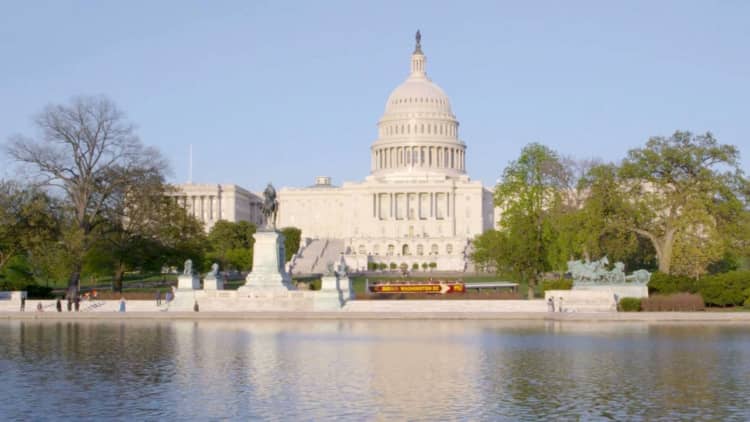
President Donald Trump is ratcheting up the pressure on Democrats to support a sweeping rewrite of the nation's tax code following his surprise deal with the party's leaders to raise the debt ceiling, fund the government and fast-track hurricane relief.
Trump is slated to make his case during a dinner Tuesday night at the White House with three key red-state Democrats: Sens. Joe Donnelly of Indiana, Joe Manchin of West Virginia and Heidi Heitkamp of North Dakota. Also attending will be influential Republican Sens. Orrin Hatch of Utah, John Thune of South Dakota and Pat Toomey of Pennsylvania, according to a White House spokeswoman.
"The president is committed to getting tax relief for middle-class Americans passed and is willing to work with Democrats and Republicans to do it," she said.
Donnelly, Heitkamp and Manchin are the only Democratic senators who did not sign a letter circulated last month by Minority Leader Chuck Schumer outlining the conditions for the party's support of tax reform. On Tuesday, Democrats will release new data attacking the Trump administration's plan to repeal the estate tax as a benefit for a handful of the wealthiest American households — and at odds with his populist agenda.
The analysis by the left-leaning Center on Budget and Policy Priorities found that only 5,400 households would benefit next year from eliminating the estate tax, or what Republicans call the "death tax." About 470 of them live in New York and another 400 live in Texas, the highest numbers in the country. Altogether, beneficiaries represent only 0.2 percent of taxpayers, the report found.
Previous research has shown that those also tend to be wealthy households. The estate tax only applies to property and assets totaling at least $5.5 million. The Tax Policy Center estimated that the top 10 percent of households by income pay 90 percent of the tax.
Getting rid of the tax is a "key plank of the Republican tax plan [that] will only benefit the wealthiest Americans while leaving middle class families out to dry," the Senate Democratic Policy Committee said in a statement.
Republicans plan to use a process known as reconciliation to pass tax reform, which would only require approval by 50 senators. But with only 52 seats, the GOP's margin remains razor thin. Winning over even a few Democrats could provide Republicans with an important buffer. And Trump's spontaneous decision to side with Schumer and House Minority Leader Nancy Pelosi on the debt ceiling package last week — over the objections of his Cabinet and GOP leadership — illustrated that the president is willing to buck his own party to cut a deal.
In addition to Tuesday's tax reform dinner at the White House, Vice President Mike Pence is slated to visit Indiana next week, the home state he shares with Donnelly. And Trump invited Heitkamp to fly with him to North Dakota last week, calling her a "good woman" during his speech there and shaking hands with her on stage.
Trump also called for repealing the estate tax in that speech, slamming it as a "tremendous burden," particularly for small businesses and family farmers. The agricultural industry is one of the biggest supporters of eliminating the tax, and Trump singled out local fourth-generation cattle rancher Julie Ellingson to make his point.
"Julie, we are not going to allow the death tax or the inheritance tax or whatever you want to call it, to crush the American dream," Trump said. "We're not going to let it happen. So, fighting hard."
The Center on Budget and Policy Priorities was unable to calculate an estimate for the number of households in North Dakota that would benefit from eliminating the estate tax in its analysis because the number is so small. Tallies were also not available for six other states.


